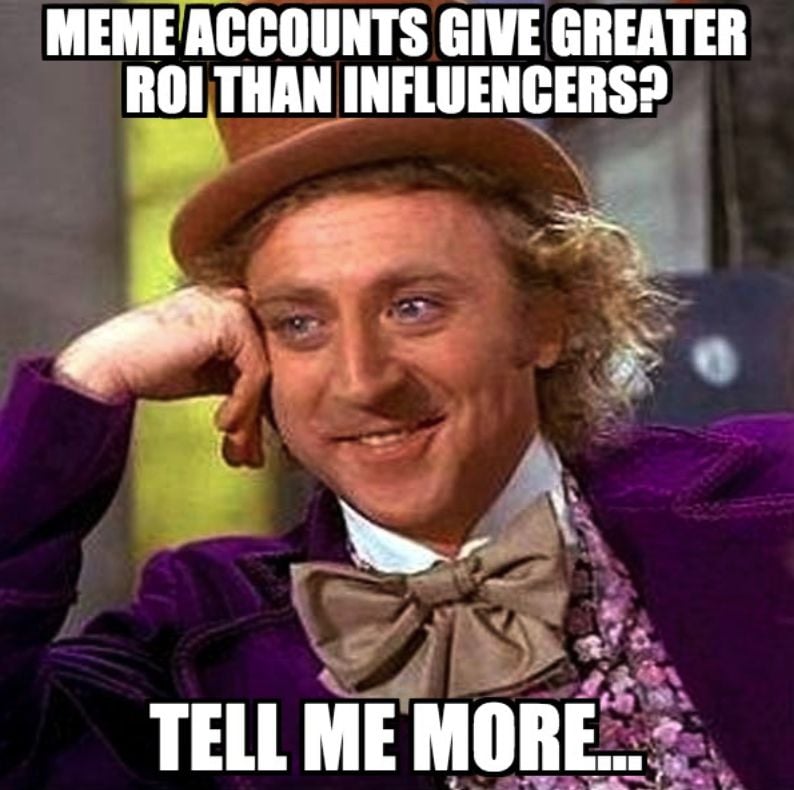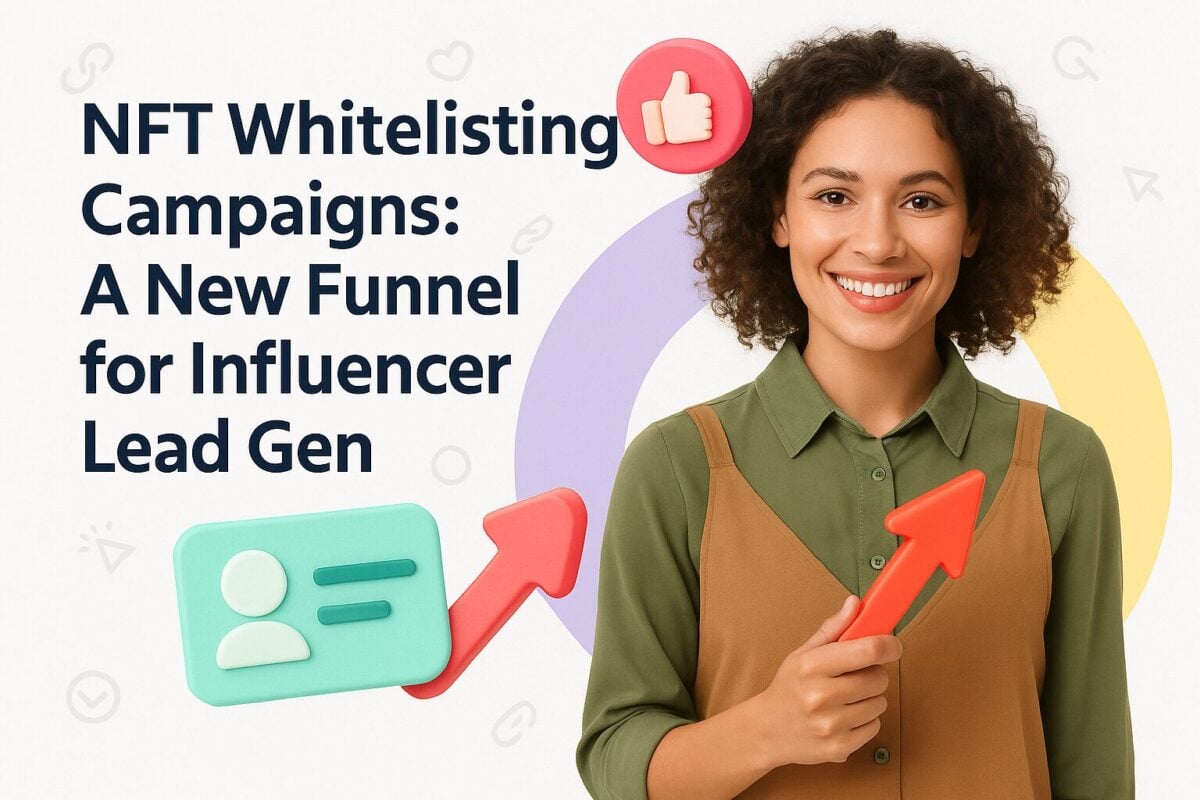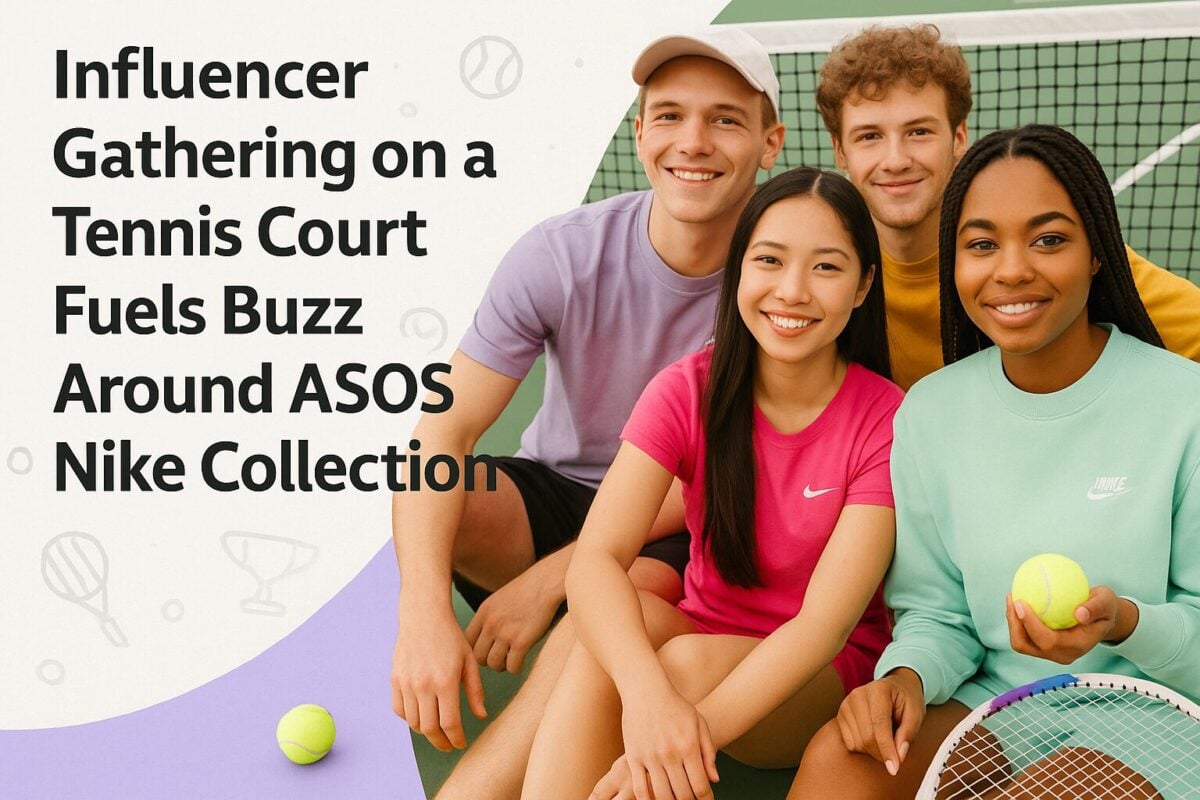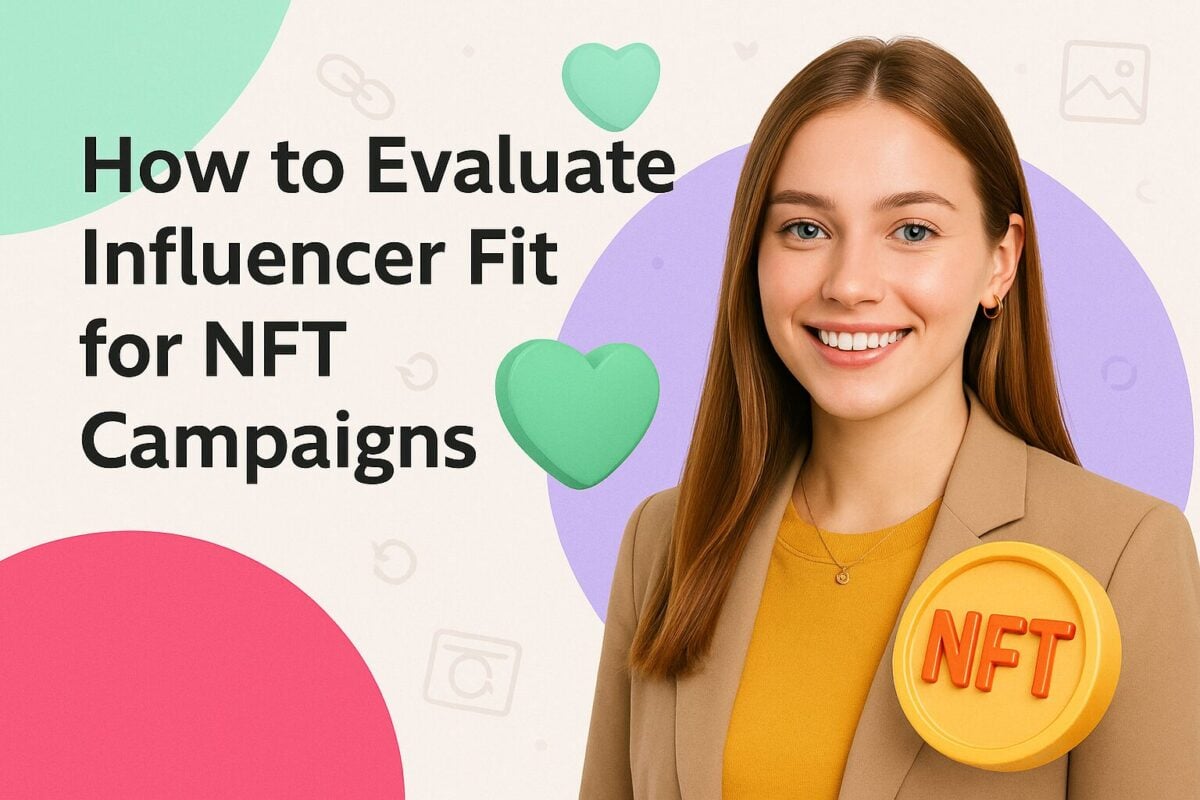Ah, memes. They’re like little one panel comic strips that anyone can make, and the best ones catch on because they’re incredibly relatable. It’s no wonder, then, that social media meme accounts continue to grow in popularity. And, as with anything that catches the attention of social media users, brands and marketers are starting to look at these accounts to reach consumers.
What they’re finding is that they can often get greater and more far-reaching engagement at a fraction of the price of influencers with comparable audience sizes. Talking to Digiday, FanBytes by Brainlabs CEO Timothy Armoo said, “For 1 million followers, you could be paying $15,000 to a human influencer, and for 1 million followers on a meme account you’d be paying about $1,000.” To put it in meme-speak, brands and marketers be like:

It should be noted here that, as with any influencer, you’re not guaranteed success just because you’ve contracted an account with loads of followers to post on your behalf. And there’s a reason why meme accounts come at a discount. Because they rely on humor—often a mix of original and republished content—there’s no central personality for readers to latch onto, no real community to feel a part of. Brands looking to develop long lasting, loyal customers aren’t going to get that when they’re just dropping content in the middle of a feed with no unifying them other than it’s funny.
At least, that all used to be the general rule. Developing a social media brand is difficult, but making it sustainably successful is a full time job. There’s so much competition out there, that these accounts are starting to look more like influencers, with the personalities behind the accounts making themselves more noticeable. And some of them have gone far beyond just being the person behind a social account.
Here are three meme accounts that have gone far beyond the simple premise of monetisation.
Three Meme Makers Who’ve Captioned Their Way to Success:
Memes Are In Vogue. Literally.
You can’t talk about meme accounts without talking about FuckJerry, the brainchild of Elliot Tebele. Arguably the godfather of all meme accounts, Tebele’s been curating content for his Tumblr account since 2011. But it was the launch of his @fuckjerry Instagram account that turned his hobby into a career. Well, maybe not the launch itself, but definitely that moment in 2014 when the account hit one million followers. That’s when Burger King paid Tebele $3,000 for his first sponsored post.
A year later, when Vogue magazine contacted Tebele for some fresh content around New York’s Fashion Week, he had become the founder of Jerry Media—a full service social media agency that owned @fuckjerry and several other social media accounts. Though Tebele and company are often criticised for relying heavily on other people’s content to fill out their posting schedule, the company showed its creative side with the Vogue partnership.
The magazine hosted what they called a “pregame extravaganza” for Fashion Week, inviting models to come relax, drink juice, get massages, and play with puppies. Not necessarily in that order. A photographer was on hand to document the event, who then handed the photos over to Tebele. Then, Tebele gave them the @fuckjerry treatment, by mixing them with some of his favorite meme captions from the past. The results are really funny, and lend a down-to-earth humanity to something almost no one can relate to: a luxury massage party attended by over 100 fashion models at a posh venue in New York City.
Today, @fuckjerry charges $30,000 for sponsored posts that will reach nearly 14 million followers. Meanwhile, Jerry Media offers a variety of social media services for some pretty big names: Subway, Paramount Pictures, Lyft, Tinder, and some kid named Justin Bieber.
Sure, Sex Sells. But Daddy Issues?
Violet Benson, the woman behind the popular Instagram account @daddyissues, is pretty unapologetic about the name she chose. In an interview with Vanity Fair, she said, “I came up with Daddy Issues because I was like, O.K., I grew up with daddy issues, most girls have daddy issues—it was just a name.” That blunt, what’s-the-big-deal-anyway attitude is a huge part of what makes the account so popular. The other factor is her commitment to cohesiveness: her brand of humor is very female-forward. Not that men won’t or don’t find her funny, but the memes she posts—most of which are her own creations—speak to the female experience in honest and hilarious ways.
Benson created the account while she was working as an accountant, and it only took nine months before she was able to quit and work on @daddyissues full time. At first, she chose to stay completely anonymous—the point of the account was just to make people laugh. It had nothing to do with her. Soon, though, it became clear that Benson had a voice beyond the jokes. Her captions and responses in the comments section revealed there was an anonymous human behind the account. Even when she’d hit 2 million followers back in 2015, she still took the time to respond to every single DM or email that came her way—the sincere ones, anyway.
She eventually “came out” as herself in an interview with MTV. The interview itself was part of the promotion of her taking over the @MTVLife Twitter account to live-tweet 2015’s Video Music Awards. This all coincided with her first big promotional gig with the dating app Bumble. After her reveal, her profile on the app became visible to everyone in the United States, with two people—one male, one female—winning a date with her. Of course, her experiences on Bumble provided no shortage of material for her account.
Today, @daddyissues has over four million followers, along with a widely read blog (which also hosts a widely-shopped merch store). While it’s a nice venue for Benson to show off her wit (and business acumen), it’s the sponsored posts on Instagram where Benson’s talent truly pays off.
You’ve Got No Sponsored Posts
Sebastian Tribbie, better known by his meme account’s handle @youvegotnomale, isn’t yet at the level of @fuckjerry or @daddyissues. His meme account’s 69,000 followers (as of this writing) seems positively quaint in comparison. He’s also adamant about never doing a sponsored post. In an interview with highsnobiety.com last year, Tribbie was very clear about it. “I’ve never done one sponsored meme post and I refuse to. It’s not my brand since I literally make memes as my career, and my followers would turn on me,” he said.
So what’s he doing on this list? Brands still come to him to create their content for meme-based campaigns. The form of a meme is so instantly recognisable, and the good ones resonate so well, that brands are more than happy to poke a little fun at themselves on their own social accounts if it means more shares. And Tribbie has made enough of a name for himself that his involvement is enough to generate excitement for a campaign. Gucci certainly made a big deal about him in this caption for a meme he created for their #TFWGucci campaign:
That starter pack, along with others Tribbie has done for hire, is proof of the low-risk high-reward scenario that is meme-based marketing. If you don’t know your memes, the starter pack conceit predates that Gucci ad and Tribbie’s career by a couple of years. Yet, other companies have paid his asking price of $2,000 for a starter pack meme all their own, not even worried that they’re doing what another brand did. Which is entirely the point of memes: the setup or structure isn’t something new, it’s part of a language that brands need to speak to reach a certain, younger segment. It’s a language that doesn’t come naturally to older, professional types, and Tribbie understands this. They need someone like him to do it for them, which is how he can charge $2k for something he said “only takes like two minutes...it’s not difficult.” Also, for a brand like Gucci, $2k is a drop in their giant marketing budget.
Welcome to the Meme Streets
There’s no doubt that memes continue to grow in popularity with social media users and, by extension, the brand marketers trying to reach those users. Social meme accounts have moved from fun-and-games to big business. For those with massive followings, you’re going to pay for it as you would to any top rated influencer. And for the smaller accounts, still on their way up, you’ll generally find a better ROI, just as you would with any micro-influencer.
The question isn’t whether memes will replace influencers, or which has the better ROI. The question is: are you reaching the audiences that you’re paying to reach, and converting them to customers and brand loyalists? Memes may be popular, but they’re not for everyone—marketers advising brands to jump off the influencer ship and start placing ads in meme account feeds are being a bit myopic. Still, if you want to reach a younger audience, memes and meme accounts need to be at least one part of an overall strategy. There are plenty of talented people behind these account who can help shape what the strategy will look like.



